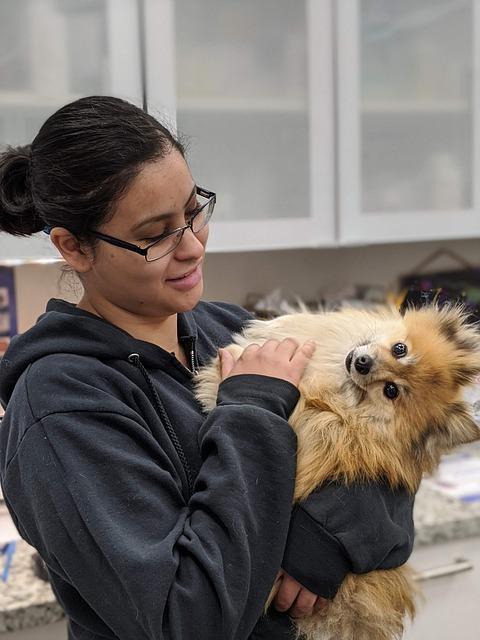Once upon a time in a cozy little town, a dog named Max eagerly awaited his meals. His owner, Sarah, often wondered if feeding him the same dog food every day was the right choice. One day, she met a veterinarian who explained that high-quality dog food is specifically formulated to meet all of Max’s nutritional needs. It provides essential vitamins and minerals for his energy and health. Sarah realized that consistency in Max’s diet not only keeps him happy but also ensures a long, healthy life. So yes, feeding dogs dog food every day is not just okay—it’s the best choice for their well-being!
Contents
- Understanding the Nutritional Needs of Dogs for Optimal Health
- The Benefits of a Balanced Dog Food Diet for Daily Feeding
- Common Misconceptions About Feeding Dogs Exclusively Dog Food
- Expert Recommendations for Choosing the Right Dog Food for Daily Use
- Q&A
Understanding the Nutritional Needs of Dogs for Optimal Health
When it comes to ensuring your canine companion thrives, understanding their nutritional needs is paramount. Dogs, like humans, require a balanced diet that provides essential nutrients for their overall health and well-being. A high-quality dog food can serve as the cornerstone of this diet, delivering the right mix of proteins, fats, carbohydrates, vitamins, and minerals. By choosing a reputable brand, you can rest assured that your dog is receiving the necessary components for optimal growth, energy, and immune function.
Feeding your dog a consistent diet of dog food every day can be beneficial, provided that the food is formulated to meet their specific life stage and health requirements. Puppies, adult dogs, and senior dogs all have different nutritional needs that must be addressed. For instance, puppies require higher levels of protein and fat to support their rapid growth, while senior dogs may benefit from lower calories and added joint support. Always consult with your veterinarian to select the best food tailored to your dog’s unique needs.
Moreover, the quality of ingredients in dog food plays a crucial role in your pet’s health. Look for options that list high-quality protein sources as the first ingredient, such as chicken, beef, or fish. Additionally, a good dog food should contain:
- Whole grains for energy
- Fruits and vegetables for vitamins and antioxidants
- Healthy fats for skin and coat health
- Probiotics for digestive health
It’s also essential to monitor your dog’s weight and overall health regularly. While feeding them dog food daily is generally acceptable, portion control and the right feeding schedule are crucial to prevent obesity and related health issues. Keep an eye on their body condition and adjust their food intake as necessary. Remember, a well-nourished dog is a happy and healthy dog, and investing in their diet is one of the best ways to ensure a long, vibrant life together.
The Benefits of a Balanced Dog Food Diet for Daily Feeding
Feeding your dog a balanced diet is crucial for their overall health and well-being. A high-quality dog food is specifically formulated to meet the nutritional needs of dogs, providing them with the essential vitamins, minerals, and nutrients they require for optimal growth and energy. By choosing a balanced dog food, you ensure that your furry friend receives the right proportions of protein, fats, and carbohydrates, which are vital for maintaining a healthy weight and supporting their active lifestyle.
One of the significant advantages of a balanced dog food diet is its role in preventing health issues. Dogs that consume a well-rounded diet are less likely to suffer from obesity, diabetes, and other chronic conditions. Regular feeding of nutritionally complete dog food helps to strengthen their immune system, making them more resilient against diseases. Additionally, a proper diet can enhance their coat condition, improve digestion, and promote healthy skin, leading to a happier and more vibrant pet.
Moreover, a consistent feeding routine with balanced dog food can contribute to better behavior and mental health. Dogs thrive on routine, and knowing they will receive nutritious meals daily can reduce anxiety and stress. A well-fed dog is often more energetic and playful, which can lead to improved social interactions with both humans and other animals. Furthermore, the right diet can support cognitive function, helping to keep your dog sharp and alert as they age.
Lastly, investing in a balanced dog food diet can save you money in the long run. While it may seem more expensive upfront, the health benefits gained from feeding your dog high-quality food can lead to fewer vet visits and lower medical costs associated with diet-related health issues. By prioritizing your dog’s nutrition today, you are setting the foundation for a longer, healthier life, ultimately resulting in a happier companion for years to come.
Common Misconceptions About Feeding Dogs Exclusively Dog Food
Many pet owners believe that feeding their dogs exclusively dog food is inadequate for their nutritional needs. However, commercial dog food is specifically formulated to meet the dietary requirements of dogs at various life stages. **High-quality dog food** contains a balanced mix of proteins, fats, carbohydrates, vitamins, and minerals, ensuring that your furry friend receives all the essential nutrients they need to thrive.
Another common misconception is that dogs will become bored or unhappy if they eat the same food every day. In reality, dogs are creatures of habit and often prefer consistency in their diet. **Changing a dog’s food frequently** can lead to digestive issues and may even cause food allergies. By sticking to a high-quality dog food, you can provide your pet with a stable and satisfying diet that supports their health and well-being.
Some owners worry that feeding their dogs only dog food will deprive them of variety and enjoyment in their meals. However, many dog foods come in various flavors and textures, allowing you to choose options that your dog will love. Additionally, you can enhance their meals with **safe, dog-friendly treats** or occasional fresh fruits and vegetables, ensuring that mealtime remains exciting without compromising their nutritional balance.
Lastly, there is a belief that homemade diets or human food are superior to commercial dog food. While home-cooked meals can be beneficial when done correctly, they often lack the comprehensive nutrition found in commercial dog food. **Consulting with a veterinarian** can help you determine the best feeding strategy for your dog, ensuring they receive a complete and balanced diet that supports their health for years to come.
Expert Recommendations for Choosing the Right Dog Food for Daily Use
When selecting dog food for your furry friend, it’s essential to prioritize quality and nutritional balance. Look for products that list **high-quality protein sources** as the first ingredient. Proteins are crucial for muscle development and overall health, so ensure that the food contains real meat, fish, or poultry rather than meat by-products. Additionally, consider the specific needs of your dog’s breed, age, and activity level, as these factors can significantly influence their dietary requirements.
Another critical aspect to examine is the presence of **essential nutrients**. A well-rounded dog food should include a mix of carbohydrates, fats, vitamins, and minerals. Ingredients like whole grains, fruits, and vegetables can provide necessary fiber and antioxidants, promoting digestive health and a robust immune system. Always check for the inclusion of omega fatty acids, which are vital for maintaining a healthy coat and skin.
It’s also wise to be cautious about **additives and fillers**. Avoid dog foods that contain artificial preservatives, colors, or flavors, as these can lead to health issues over time. Instead, opt for brands that utilize natural preservatives like tocopherols (vitamin E) and have a transparent ingredient list. Reading reviews and seeking recommendations from veterinarians can help you identify reputable brands that prioritize your dog’s health.
Lastly, consider the **feeding guidelines** provided by the manufacturer. Each dog has unique caloric needs based on their size and lifestyle, so it’s crucial to follow the recommended serving sizes to prevent obesity and related health problems. Transitioning to a new food should be done gradually to avoid digestive upset, and monitoring your dog’s weight and overall condition will help you make necessary adjustments to their diet. By taking these factors into account, you can ensure that your dog receives the best nutrition possible every day.
Q&A
-
Is it safe to feed my dog commercial dog food every day?
Yes, it is safe to feed your dog commercial dog food every day, provided it meets the nutritional standards set by the Association of American Feed Control Officials (AAFCO). Quality dog food is formulated to provide balanced nutrition, ensuring your dog receives the essential vitamins and minerals needed for optimal health.
-
Can feeding my dog the same food daily lead to health issues?
Feeding your dog the same high-quality dog food daily is generally safe and can prevent digestive upset. However, it’s important to monitor your dog’s health and consult with your veterinarian if you notice any changes in behavior, weight, or coat condition. Variety can be introduced through occasional treats or different flavors of the same brand.
-
How do I know if the dog food is appropriate for daily feeding?
To ensure the dog food is appropriate for daily feeding, check for the AAFCO statement on the packaging, indicating it meets complete and balanced nutrition standards. Additionally, consider your dog’s age, size, and specific dietary needs, and consult with your veterinarian for personalized recommendations.
-
Should I supplement my dog’s diet if I feed them dog food every day?
In most cases, if you are feeding a high-quality, complete dog food, additional supplements are unnecessary. However, some dogs may benefit from specific supplements based on their health needs, such as omega fatty acids for skin health or joint supplements for older dogs. Always consult your veterinarian before adding any supplements to your dog’s diet.
feeding your dog a high-quality dog food daily is not only acceptable but essential for their health and well-being. Prioritize balanced nutrition to ensure your furry friend thrives. Choose wisely, and watch them flourish!

大家好,我是彼得潘,專業的手法身體治療師。我喜歡探索和研究各種主題,並透過與人工智慧的合作分享專業、實用、有趣的文章。我們定期進行人工審核,以確保內容的準確性。如果您發現文章中有任何不準確的地方,請隨時與我們聯繫,我們會及時糾正。您可以透過 [email protected] 與我們聯繫。



